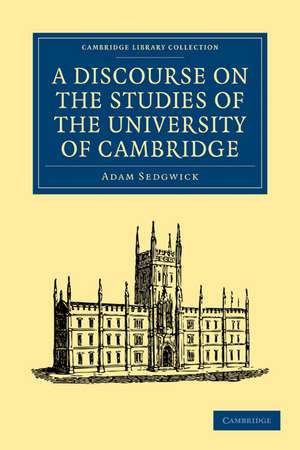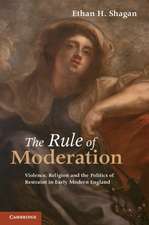A Discourse on the Studies of the University of Cambridge: Cambridge Library Collection - Cambridge
Autor Adam Sedgwicken Limba Engleză Paperback – 19 iul 2009
Din seria Cambridge Library Collection - Cambridge
-
 Preț: 368.10 lei
Preț: 368.10 lei - 19%
 Preț: 433.69 lei
Preț: 433.69 lei -
 Preț: 371.20 lei
Preț: 371.20 lei -
 Preț: 245.13 lei
Preț: 245.13 lei -
 Preț: 277.67 lei
Preț: 277.67 lei - 19%
 Preț: 433.82 lei
Preț: 433.82 lei -
 Preț: 180.57 lei
Preț: 180.57 lei -
 Preț: 445.49 lei
Preț: 445.49 lei -
 Preț: 353.10 lei
Preț: 353.10 lei -
 Preț: 190.85 lei
Preț: 190.85 lei -
 Preț: 239.16 lei
Preț: 239.16 lei -
 Preț: 172.19 lei
Preț: 172.19 lei -
 Preț: 235.28 lei
Preț: 235.28 lei -
 Preț: 249.65 lei
Preț: 249.65 lei - 19%
 Preț: 481.86 lei
Preț: 481.86 lei -
 Preț: 366.57 lei
Preț: 366.57 lei -
 Preț: 238.55 lei
Preț: 238.55 lei -
 Preț: 371.58 lei
Preț: 371.58 lei -
 Preț: 239.91 lei
Preț: 239.91 lei -
 Preț: 367.71 lei
Preț: 367.71 lei -
 Preț: 465.98 lei
Preț: 465.98 lei -
 Preț: 371.74 lei
Preț: 371.74 lei - 19%
 Preț: 533.91 lei
Preț: 533.91 lei -
 Preț: 315.54 lei
Preț: 315.54 lei -
 Preț: 411.81 lei
Preț: 411.81 lei -
 Preț: 336.15 lei
Preț: 336.15 lei -
 Preț: 240.50 lei
Preț: 240.50 lei -
 Preț: 238.55 lei
Preț: 238.55 lei -
 Preț: 146.11 lei
Preț: 146.11 lei -
 Preț: 327.65 lei
Preț: 327.65 lei -
 Preț: 475.47 lei
Preț: 475.47 lei -
 Preț: 179.81 lei
Preț: 179.81 lei -
 Preț: 329.78 lei
Preț: 329.78 lei - 19%
 Preț: 458.43 lei
Preț: 458.43 lei -
 Preț: 223.99 lei
Preț: 223.99 lei -
 Preț: 242.80 lei
Preț: 242.80 lei -
 Preț: 260.68 lei
Preț: 260.68 lei -
 Preț: 372.51 lei
Preț: 372.51 lei - 19%
 Preț: 505.37 lei
Preț: 505.37 lei - 19%
 Preț: 477.95 lei
Preț: 477.95 lei -
 Preț: 496.30 lei
Preț: 496.30 lei -
 Preț: 244.64 lei
Preț: 244.64 lei
Preț: 499.21 lei
Preț vechi: 616.31 lei
-19% Nou
Puncte Express: 749
Preț estimativ în valută:
95.53€ • 99.94$ • 79.35£
95.53€ • 99.94$ • 79.35£
Carte tipărită la comandă
Livrare economică 02-16 aprilie
Preluare comenzi: 021 569.72.76
Specificații
ISBN-13: 9781108001991
ISBN-10: 1108001998
Pagini: 776
Dimensiuni: 152 x 229 x 39 mm
Greutate: 1.02 kg
Ediția:Revised
Editura: Cambridge University Press
Colecția Cambridge University Press
Seria Cambridge Library Collection - Cambridge
Locul publicării:Cambridge, United Kingdom
ISBN-10: 1108001998
Pagini: 776
Dimensiuni: 152 x 229 x 39 mm
Greutate: 1.02 kg
Ediția:Revised
Editura: Cambridge University Press
Colecția Cambridge University Press
Seria Cambridge Library Collection - Cambridge
Locul publicării:Cambridge, United Kingdom
Cuprins
Preface to the First Edition; Preface to the Fifth Edition; Part I. Preliminary Dissertation: 1. Introductory remarks on the doctrine of final causes; 2. Theory of spontaneous generation, transmutation of species, &c.; 3. Fœtal transformations, and their bearing on the theory of development; 4. Organic phenomena of geology, and general remarks on their bearing on the theory of development; 5. Animal and vegetable remains of the primary or Palæozoic division; 6. Fossils of the secondary division, &c.; 7. Organic remains of the tertiary division, &c.; 8. Materialism. Mechanical and moral laws. Laws of chance. Tendencies of modern science. Fantastical views of nature. Evils of rash generalisation. Education, &c.; 9. Conditions of the mind that have led men to deny a personal creator. Atheism and pantheism. Illustrations of the doctrine of final causes. Galvanic and phrenological hypotheses. Mechanical inventions, &c.; 10. On the ideal theory of Locke - imperfections of his analysis. Schools of the idealist and the Sensualists. Mischief of setting up idealism as the interpreter of material nature, illustrated by the works of Oken, &c.; 11. Digression on some discoveries of Oken followed out by Owen. Archetype of nature. General scale of nature. Never existed at one time in the history of the earth. The reconstruction of the scale subversive of the theory of development, &c.; 12. Reconsideration of the argument for final causes. Miracles. Belief in a first cause, and moral conclusions from it. Induction of the fountain of all material truth, &c.; Part II: 1. Pantheistic views of revelation and its evidences, and comments on the Newtonian philosophy. Evidences of Christianity, historical and prophetical. Moral purity of the gospel. Its propagation and effects on the progress of man, &c.; 2. Recent changes in the University course. Modern science of Cambridge - Philosophical society. Modern external improvements. Moral and social character of the students, &c. External improvements in Cambridge; 3. Modern religious movements. Principles of the Church of England contrasted with those of the Church of Rome. Tracts for the times. Terms of communion. Immorality of the tracts. Acts of apostasy. Causes of error in our estimate of religious and moral questions. True Catholicity. Conclusion; Part III. Discourse: Appendix to the Discourse; Supplement to the Appendix.
Descriere
Geologist Adam Sedgwick's 1850 book gives a wide-ranging overview of the academic debates of his day, and his opinions.













